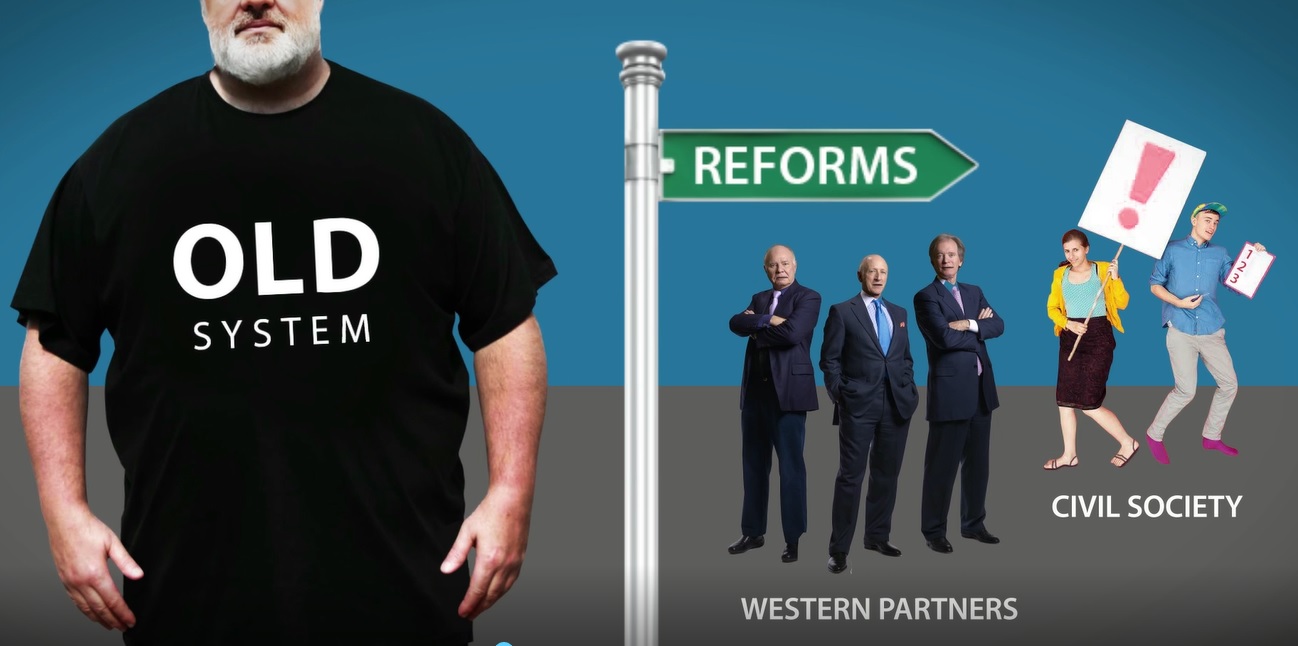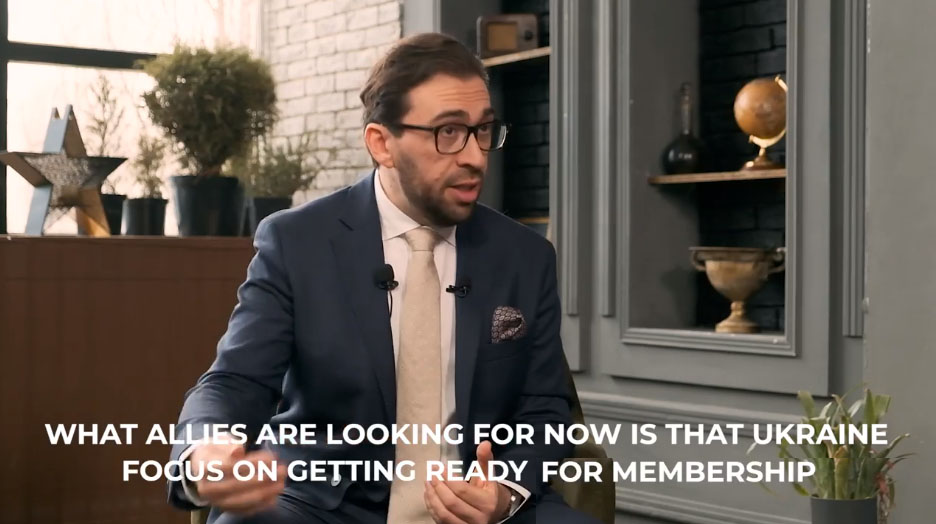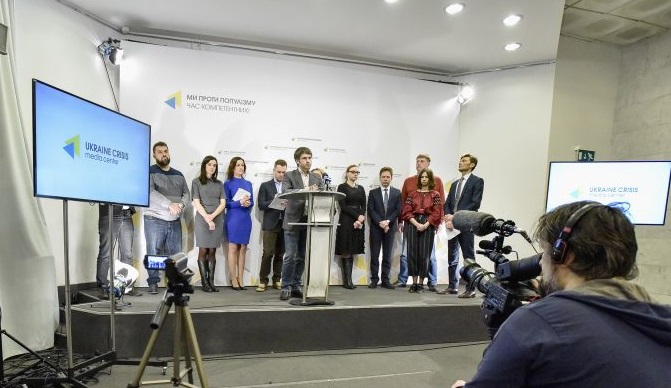The Ukrainian judiciary had dozens of scandals in 2019. An overwhelming majority of them were related to the controversial decisions of judges or the opacity of the system itself. As a result, the judiciary tops the list of least trusted Ukrainian institutions. Reform of the system was launched first by President Petro Poroshenko and then by President Volodymyr Zelenskyy. Nevertheless, the main problems of the system have not changed. Political dependence and dishonest judicial self-governance has resulted in dishonest judges keeping their positions for many years. Civil society organizations dealing with this topic have suggested solutions for improving the situation and even managed to advocate these issues to MPs. However, so far resistance from the judicial system is stronger and potential solutions have been recently blocked.
At the end of 2019, the Ilko Kucheriv Democratic Initiatives Foundation together with the Razumkov Center released the results of a survey which included the level of trust from society towards different institutions. It showed that the judiciary is the least trusted Ukrainian institution with a negative balance of trust at -62.2%.
According to the poll, only Russian media generates less trust in Ukraine. The research was conducted in all regions of Ukraine except for the occupied regions, with 2,017 respondents aged 18 and above who were surveyed.
Problem number one: Political dependence

A remarkable event happened at the end of 2019. 76 Ukrainians were released as a result of the all-for-all prisoner swap with the Russian-run Donbas statelets, the so-called Luhansk and Donetsk People’s Republics (LNR and DNR). An aide to the Ukrainian security council’s secretary mentioned that 127 people were handed over to occupied areas.
However, the exchange itself was also marred by a judicial scandal. To provide Russia with the people it demanded for the exchange, Ukraine first had to find a way to release them. Many had been involved in organizing terrorist attacks across Ukraine. Among them were three terrorists who organized an explosion in Kharkiv during the Walk of Dignity in 2015. As a result, four people were killed, including a child. One day before the exchange, the court declared its verdict recognizing the four people as guilty. They were sentenced to life imprisonment with confiscation of all their property. Additionally, the verdict had the following unprecedented sentence:
“Prior to the verdict coming into force, the preventive measure shall be changed from pre-trial detention ito personal obligation, releasing them from custody immediately.”
However, the greatest public outrage was caused by releasing five ex-Berkut police officers, who are accused of killing of 48 and injuring 80 protesters on 20 February 2014 during the Revolution of Dignity.
The news sparked heated discussions and caused divisions within society. Some believe that those responsible for the Euromaidan massacre must face justice, or at least cannot be released without a verdict, which likely means that Ukraine’s most resonant contemporary crime may never be solved. The resulting air of unclarity would be exactly what Russia, which claims that Ukraine’s Euromaidan revolution was a coup, wants. Others, including the president, were saying that saving even one life of a political prisoner being tortured in prison in the occupied territory was worth it.
However, let’s take a look at the court’s role in this process from a technical point of view, and not jump into discussions of morality.
When the question of the release of the Berkut officers for the exchange was put on the agenda, few doubts remained that the officers would soon leave Ukraine.
The relatives of those killed during the Euromaidan Revolution, represented by the Advocacy Advisory Panel and prosecutors working on the case for years, resisted simply releasing the Berkut officers. Perhaps that is why a day before the exchange, Prosecutor General Ruslan Riaboshapka made the decision to replace these prosecutors with a group of more loyal ones. As a result, the court made its decision to release the Berkut officers on personal obligation, allowing them to participate in the exchange, without much resistance.
"We would like to apologize to the victims and the court and to say in this situation that we feel embarrassed for this all," one of the prosecutors from the initial group said when leaving the court hearing.
In these circumstances, the judges were given only a formal role. It was clear that the decision regarding the release was already made by those at the top-management level in Ukraine. The Berkut officers were released without a verdict.
Later, President Zelenskyy admitted that it was a political decision that was difficult to make, keeping in mind the victims of the Kharkiv terrorist attack and relatives of those killed during the Euromaidan revolution.
"However, I've also met the relatives of the captives. That is why the decision had to be made. Unfortunately, we can't return fallen heroes. However, returning living heroes is my obligation as of the president of Ukraine," Zelenskyy explained his decision.
The cases which attracted the most attention led to the conclusion that in high profile political cases, the final decisions can hardly be made by judges. Instead, politicians and the authorities are keeping that right.
Problem number two: Dishonest self-governance
Judicial self-governance in Ukraine is represented by two bodies, the High Qualification Commission of Judges (HQCJ) and the High Council of Justice (HCJ). Civil society organizations involved in changing the judiciary, apart from the lack of political will, blamed the HQCJ and the HCJ in failing to implement Poroshenko's judicial reform.
Half of both two bodies consist of judges elected by judges. The resulting conflict of interest and led to a faked qualification assessment of judges, with numerous corrupt and dishonest judges keeping their seats.
Observing these failures, Ukrainian experts in the judiciary began to insist on changing the principles of how the HQCJ and HCJ are formed.
Their recommendations have been only partially heard by the authors of Zelenskyy's judicial reform. Moreover, even they have been recently blocked.
In particular, the reform foresaw changing the procedure of how the HQCJ is formed. According to the new legislation, its members should be selected on a competitive basis. The competition commission would consist of three representatives of the Council of Judges and three international experts. So far the only court in Ukraine where judges were selected with the participation of international experts was the High Anti-Corruption Court. The step helped to eliminate judges with tainted reputations being appointed to the court. Therefore, the reform of the HQCJ was welcomed by Ukrainian experts and Ukraine’s international partners.
Another positive step was creating the Integrity Commission which consists of three members of the HCJ and three international experts. The Commission will be responsible for checking HCJ members and punishing the Supreme Court judges for gross disciplinary offenses.
Still, despite the recommendations from the expert community, the reform has not foreseen changing the procedure for forming the HCJ itself.
The body is blamed for letting at least 44 dishonest candidates be appointed to the new Supreme Court, for allowing judges who were responsible for the prosecution of Euromaidan activists to keep their positions, for exerting pressure on independent judges or blocking them, for legalizing disinformation in judges’ declarations of integrity and family connections, and finally, for still retaining members of the HCJ who do not fit the criteria needed for their job.
However, by the middle of January 2020, it looks like there is a high chance for Zelenskyy’s reform to fail as well.
The reform that was blocked from the start
Opposition to the reform came from different directions.
First, the HCJ set the rules for the competition to the HQCJ by providing benefits to judges, allowing corrupt judges to become winners easily, and significantly reducing the role of the international experts.
Lawyer Roman Maselko reacted by saying that he refuses to apply for the competition now, despite him planning to do so after the launch of the reform.
“Under such conditions, participation in the competition is senseless. Therefore, I will not apply for this competition. Probably, it will not even happen at all, because thanks to the actions of the HCJ, international partners did not submit their representatives to the competition commission. There is no one who would select the HQCJ.”
- Read also: Roman Maselko: My promise to slain Euromaidan activists is to bring bad judges to justice
The lawyer says that the only chance for the real competition is to change the procedures for the Competition Commission format and deprive the HCJ of their abilities to block reform.
On 15 January, Zelenskyy’s reform was also blocked by the Parliament.
MPs did not support the amendments that were called to pass the appeals on the new HQCJ members’ appointments from the Kyiv District Administrative Court to the new Supreme Court. The latter receives a higher level of trust, while the Kyiv District Court is in the list of one of the most scandal-plagued courts in Ukraine.
In December 2017, then-President Poroshenko made a number of decisions regarding the liquidation of courts. Liquidating the Kyiv District Administrative Court was planned and agreed upon with the HCJ.
However, at the eleventh hour, it was excluded from the list of courts that needed to be liquidated. The court continued operating and making dubious decisions.
Despite the recommendations of the corresponding committee and promises to Ukraine’s international partners, Parliament declined the amendments.
“If the amendments are not supported, it means that Andriy Portnov and the head of the Kyiv District Court Pavlo Vovk will decide who will become judges in Ukraine during the last four years,” warned Mykhailo Zhernakov, the head of the DEJURE Foundation, before the voting.
Vovk is known for covering corrupt judges and obstructing reforms in the court that he heads. Portnov used to be a key figure in the judicial system during the rule of runaway President Viktor Yanukovych and now is associated with the revenge of the old guard.
Also, on 16 January, the Constitution Court started to consider a submission that recognizes the legislation launching Zelenskyy's reform as unconstitutional.
The lack of political will and resistance of the old system are the main obstacles for judicial reform. Furthermore, it lacks advocates for reform within the government while civil society organizations remain the main force promoting change.





